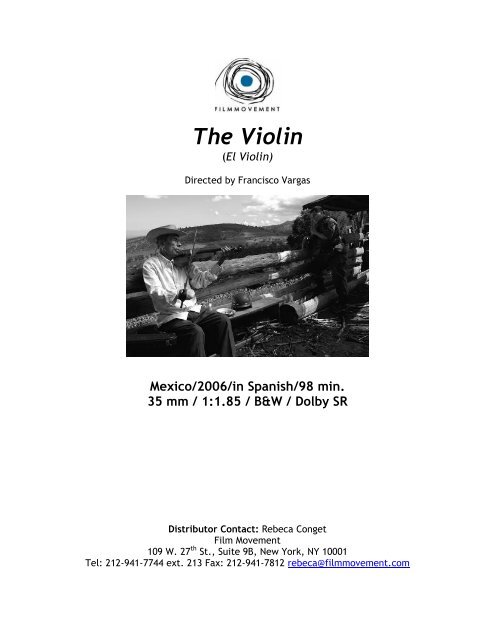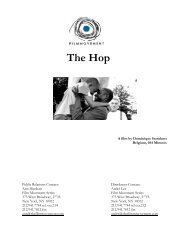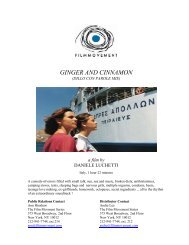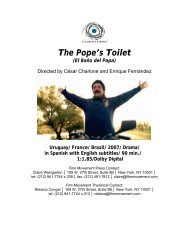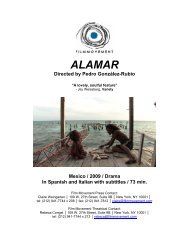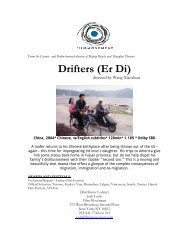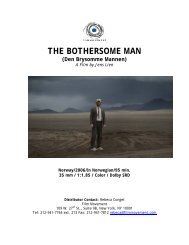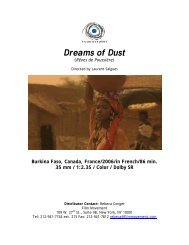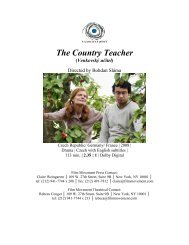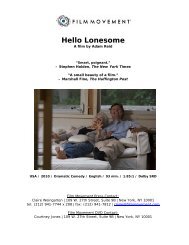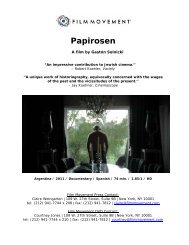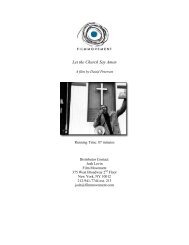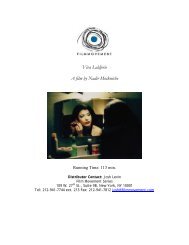THE VIOLIN FM Press Kit NEW - Film Movement
THE VIOLIN FM Press Kit NEW - Film Movement
THE VIOLIN FM Press Kit NEW - Film Movement
You also want an ePaper? Increase the reach of your titles
YUMPU automatically turns print PDFs into web optimized ePapers that Google loves.
The Violin<br />
(El Violin)<br />
Directed by Francisco Vargas<br />
Mexico/2006/in Spanish/98 min.<br />
35 mm / 1:1.85 / B&W / Dolby SR<br />
Distributor Contact: Rebeca Conget<br />
<strong>Film</strong> <strong>Movement</strong><br />
109 W. 27 th St., Suite 9B, New York, NY 10001<br />
Tel: 212-941-7744 ext. 213 Fax: 212-941-7812 rebeca@filmmovement.com
SYNOPSIS<br />
Don Plutarco, his son Genaro and his grandson Lucio live a double life: on one<br />
hand they are musicians and humble farmers, on the other they also support the<br />
campesino guerilla movement's armed efforts against the oppressive<br />
government. When the military seizes the village, the rebels flee to the sierra<br />
hills, forced to leave behind their stock of ammunition.<br />
While the guerillas organize a counter-attack, old Plutarco executes his own plan.<br />
He plays up his appearance as a harmless violin player, and makes it back into<br />
the military-occupied village to try to recuperate the ammunition hidden in his<br />
corn field. His violin playing charms the army captain, who orders Plutarco to<br />
come back daily, consequently developing a relationship in which arms and<br />
music play a tenuous game of cat-and-mouse, which ultimately results in painful<br />
betrayal.
FESTIVALS/AWARDS (Excerpt)<br />
The Violin is the most internationally awarded Mexican film in history!<br />
WINNER – THREE ARIELES AWARDS - BEST DIRECTORIAL DEBUT, BEST<br />
SCREENPLAY, BEST ACTING TEAM, MEXICAN ACADEMY OF ARTS AND<br />
SCIENCES 2007<br />
WINNER – UN CERTAIN REGARD - BEST ACTOR, CANNES FILM FESTIVAL<br />
2006<br />
WINNER – HORIZONS AWARD - SPECIAL MENTION, SAN SEBASTIAN INT’L<br />
FILM FESTIVAL 2006<br />
WINNER – JURY AWARDS: BEST FILM, BEST SCRIPT, BEST ACTOR / <strong>THE</strong><br />
AUDIENCE AWARD: BEST FILM / <strong>THE</strong> CRITICS AWARD: BEST FILM),<br />
GRAMADO FILM FESTIVAL 2006<br />
WINNER – BEST IBERO-AMERICAN FILM, MIAMI INT’L FILM FESTIVAL 2007<br />
WINNER – SKYY AWARD & AUDIENCE AWARD, SAN FRANCISCO INT’L<br />
FILM FESTIVAL 2007<br />
WINNER – BEST FIRST WORK AND BEST CINEMATOGRAPHY AWARD,<br />
PROVIDENCE LATIN AMERICAN FILM FESTIVAL 2007<br />
WINNER – AUDIENCE AWARD, MORELIA INTERNATIONAL FILM FESTIVAL<br />
2006<br />
WINNER – SPECIAL JURY AWARD & CRITICS AND PRESS AWARD: BEST<br />
FILM, ECUADORIAN IBERO-AMERICAN FILM FESTIVAL 2006<br />
WINNER – SPECIAL JURY AWARD & HONORABLE MENTION FOR BEST<br />
ACTOR, SAN PAOLO FILM FESTIVAL 2006<br />
WINNER – BEST FEATURE FILM, GOLD AWARD FOR BEST FILM & GOLD<br />
AWARD FOR BEST CINEMATOGRAPHY, SPANISH IBERO-AMERICAN FILM<br />
FESTIVAL 2006<br />
WINNER – BEST FEATURE FILM, FRENCH INTERNATIONAL ENVIRON-<br />
MENTAL FESTIVAL 2006<br />
WINNER – BEST HUMAN RIGHTS FILM, TESALONICA, GREECE<br />
INTERNATIONAL FILM FESTIVAL 2006<br />
WINNER – IBERO-AMERICAN JURY GRAND PRIZE, MIAMI INTERNATIONAL<br />
FILM FESTIVAL 2007<br />
WINNER – JURY GRAND PRIZE, FRENCH MUSIC FESTIVAL 2006<br />
WINNER – BEST FILM, URUGUAY INTERNATIONAL FILM FESTIVAL 2006<br />
WINNER – BEST CINEMATOGRAPHY, BOGATA FILM FESTIVAL 2007<br />
WINNER – BEST FILM AND AUDIENCE AWARD, QUEBEC THREE<br />
AMERICAS FESTIVAL 2007<br />
WINNER – AUDIENCE AWARD FOR BEST PICTURE, KERALA, INDIA<br />
INTERNATIONAL FILM FESTIVAL 2006<br />
OFFICIAL SELECTION – TORONTO INTERNATIONAL FILM FESTIVAL 2006<br />
OFFICIAL SELECTION – CHICAGO INTERNATIONAL FILM FESTIVAL 2006<br />
OFFICIAL SELECTION – SEATTLE INTERNATIONAL FILM FESTIVAL 2007<br />
OFFICIAL SELECTION – MONTREAL FESTIVAL DU NOUVEAU CINEMA 2006
CREDITS<br />
CREW<br />
Written, directed and produced by Francisco Vargas<br />
Cinematography Martín Boege Paré<br />
Production Manager Luz Mariá Reyes, Claudio “Pache”Contreras<br />
Editing Francisco Vargas Quevedo, Ricardo Garfias<br />
Sound design Matías Barberis, Enrique Greiner, Marco A.<br />
Henández<br />
Sound Recording Isabel Muñoz Cota<br />
Original music Cuauhtémoc Tavira, Armando Rosas<br />
Casting Natalia Beristain, Isabel Cortazar<br />
Costumes Rafael Ravello<br />
Make-up Rubén Molina, Mario Zarazua<br />
Produced by Fidecine-Mexico (Fondo de Inversión y<br />
Estímulos al Cine)<br />
Centro de Capacitación Cinematográfica, A.C<br />
With support from Cinéma en construction Toulouse (France)<br />
Donostia San Sebastián (Spain)<br />
CAST<br />
Don Plutarco Don Ángel Tavira<br />
The Captain Dagoberto Gama<br />
The Lieutenant Fermín Martínez<br />
Genaro Gerardo Taracena<br />
Lucio Mario Garibaldi
CAST’S BIOS<br />
Don Angel Tavira (Don Plutarco)<br />
Don Angel Tavira was born in Corralfalso, Guerrero (Mexico) on July 3, 1924. He<br />
is the direct descendant of an important line of traditional musicians, beginning<br />
with his grandfather, Bartolo Tavira, at the end of the 19 th Century.<br />
He started playing the violin at age six and rapidly became an expert in the field.<br />
At thirteen, his life changed drastically because of an accident in which he lost<br />
his right hand. Despite this, he continued to do what he loves most: playing the<br />
violin.<br />
During the course of his life, he has been a farmer, a musician, an elementary<br />
and high school teacher, among others. He has also dedicated a large part of his<br />
life to the training of several generations of musicians, At age sixty, he went to<br />
the Conservatory of Music in Morelia to study score transcription in an effort to<br />
save traditional music. To continue his dream, Don Angel was also musical<br />
director of the group Hermanos Tavira Band, one of the rare bands concerned<br />
with saving and maintaining original traditional music.<br />
Don Angel had his first experience in film with Francisco Vargas in the the<br />
making of the documentary Tierra Caliente…Se Mueven Los Que La Mueven—<br />
the story of Don Angel, and his efforts to preserve the musical heritage of his<br />
community, Tierra Caliente, Guerrero.<br />
Dagoberto Gama (The Captain)<br />
Born in 1959, Dagoberto Gama has acted in some 20 Mexican films since 1986.<br />
His credits include The Crime of Padre Amaro (Carlos Carrera, 2002) and Amore<br />
Perros (Alejandri Gonzalez Inarritu, 2000.) Ha has also acted in over 20 theater<br />
productions.<br />
Gerardo Taracena (Genaro)<br />
Born in 1970, since 1993 he has participated in both Mexican films and coproductions.<br />
His credits include Sin Dejar Huella (Maria NOvaro, 2000), Man on<br />
Fire (Tony Scoot, 2004) and the recent Apocalypto (Mel Gibson, 2006.) He has<br />
also acted in over 20 theater productions.<br />
Fermin Martinez (The Lieutenant)<br />
Born in 1962, Fermin Martinez began his career in American films like The<br />
Mexican (Gore Verbinski, 2001) and Frida (Julie Taymor, 2002.) He has also<br />
acted in 17 theater productions.
DIRECTOR’S BIO<br />
Francisco Vargas<br />
After studying theatre, at the National Insititute of the Arts, Francisco Vargas<br />
studied Communications at the Universidad Autonoma Metropolitana, as well as<br />
Dramatic Arts at the Hugo Argüelles workshop. In 1995, he began his studies in<br />
directing and cinematography at the University Center of Cinematography<br />
Studies. Conejo, his first short film, obtained a solid reputation while touring the<br />
international film festival circuit.<br />
For some five years, he produced radio shows to help preserve and promote<br />
traditional Mexican music.<br />
Since 1997, he has worked as a director or director of photography on several<br />
commercials, documentaries and short films.<br />
In 2004, he made a documentary, Tierra Caliente... Se Mueven Los Que La<br />
Mueven, which was soon acclaimed in Mexico and the rest of the world.<br />
The Violin, the short film, was selected by the Cannes <strong>Film</strong> Festival for the<br />
Cinéfondation.<br />
In 2006, the feature length version of The Violin was selected by the Cannes <strong>Film</strong><br />
Festival as an Official Selection - Un Certain Regard.<br />
The Violin is his first feature film.
INTERVIEW WITH FRANCISCO VARGAS (by Susan King, December 2007)<br />
Can you talk about the inception of the movie? Did you know Angel Tavira and<br />
wanted to write a movie for him or were you interested in telling a political story<br />
and cast him in the film?<br />
The Violin was born out of a whole life process, nurtured by lucky encounters with<br />
magical people, like my two great-grandmothers. One who died at age 115, and inspired<br />
the image of the old storyteller, and the other one, a tough, hardened woman who rode<br />
horses, smoked cigars and drank alcohol; all this in the middle of the 19th century. That<br />
inspired the image of Don Plutarco, tough and tireless. Both these people were very<br />
strong in my life, and in the dramatic structure of this film; but also the love for music and<br />
Mexican traditions. And all within the context of the reality that’s lived, on a daily basis,<br />
by millions of Mexicans and Latin Americans since many decades.<br />
I always wanted to write a script about this hidden Mexican reality. Today, still, these<br />
muffled voices must resort to pressure methods as absurd or dangerous as armed<br />
uprisings to make themselves heard. And it’s not something I’m trying to justify, quite the<br />
opposite. However, I present it in the film, since at this very moment, and for very many<br />
years, in many Mexican regions the people suffer governmental violence or human<br />
rights violations. The alternative voices to the “official democracy” are repressed.<br />
The case of Don Angel is interesting, because I met him a long time after I finished this<br />
film’s script, however, once I met him and I found out that he plays the violin with only<br />
one hand, I though he was a strong and exceptional human being. He comes from a<br />
family of musicians with a tradition that dates back 150 years. And the music in his<br />
region, in the state of Guerrero, in his town, is disappearing, and there are only, apart<br />
from Don Angel, about 6 or 7 old people who play. So I decided to make a documentary<br />
about the music on this region. That film is called "Tierra Caliente, se mueren los que la<br />
mueven" ("Tierra Caliente, The Best Ones Are Passing Away")<br />
After that I decided to start The Violin. And because of the characteristics of this movie-the<br />
shoot had to be only 4 weeks, in the mountain, with very cold temperatures, with<br />
limited material, a small crew, etc…--I decided it would be good to have an actor as the<br />
protagonist, so I asked the casting director to find one. But after 6 months of not finding<br />
him, she came back to me and suggested looking among the old musicians that I<br />
already knew and with whom I had worked on the documentary. At that moment I said<br />
that we could stop the search and I would invite Don Angel to work in the film, although<br />
there was a risk because of his lack of experience as an actor. And the greatest surprise<br />
for everyone was that he ended up being a great actor, since he is a born artist, all his<br />
live devoted to music, and when it was time to shoot we only had to train him and take<br />
him to the set. And apart from his great screen presence and charisma, his work is the<br />
result of, not only my own work, but the work and support he always had from the<br />
wonderful professional actors that were by his side, guiding him and supporting him.<br />
Great actors like Dagoberto Gama, Gerardo Taracena or Justo Martinez, who worked as<br />
actors and at the same time as teachers.
Had he ever acted before? I heard he was 81? Has he made any other movies<br />
since?<br />
Although he’s already an old man, Don Ángel is now devoted to promoting his most<br />
recent album in Mexico. And regarding film, they have recently called him to play a small<br />
part in another movie. Let’s hope we will soon see him on screen.<br />
Would you talk a bit about the political climate in Mexico during the time the film<br />
is set?<br />
When the spectator enters the film, the black and white erases the temporal and spatial<br />
limitations. This element, as well as the use of handheld camerawork and the mix of<br />
professional and non-professional actors, are the choices with which I try to give the film<br />
a documentary-like feel.<br />
Also, since the writing of the script, I worked on it in such a way that all references to any<br />
Mexican socio-political event were erased. The set and costume design teams followed<br />
that same guideline to construct a reality that refers to both a Mexican and a more<br />
general Latin American feel. So that it could be Colombian, Bolivian, Guatemalan, or<br />
from any of our Latin American countries that have suffered the same experience of<br />
confrontation between a civil society and its government, and of armed uprisings, since<br />
memory serves us.<br />
Sometimes I like to clarify that, actually, The Violin does have a defined space and time<br />
period. Only that it is more difficult to point out--one merely needs to grab a world map<br />
and put it in front, close one’s eyes, and point at a random spot on it; if you’re not<br />
pointing to the sea, then you’ll be pointing at a place where a similar story has taken<br />
place since centuries ago, is taking place right now, and, unfortunately, will still take<br />
place in the future.<br />
Were you surprised at the international acclaim for the film? I read that the film<br />
has won more international awards than any other film in Mexican cinema history.<br />
Yes, it has become the most awarded film, which is something that fills me with pleasure<br />
and emotion, because it’s the recognition of the work of everyone that was involved in<br />
the film. One can’t forget that a film is not made by a single person, and that’s why we<br />
have received awards for the actors, art design, direction, screenplay, cinematography…<br />
And getting awards has given us the opportunity to have this film seen in the most<br />
remote places, where otherwise it maybe would never have arrived. They (festivals and<br />
awards) are a wonderful window to be able to carry that message further.<br />
And in a certain way it did surprise me, because when one is making a film one is not<br />
thinking about the prizes or recognition, or festivals or fame. One is thinking of how to tell<br />
a story the best way possible, in the most honest way, and, in Mexico, because of the<br />
characteristics of our film industry, when you’re filming you’re thinking about how you will<br />
finish the movie.
What are you working on now?<br />
I am finishing the promotion for The Violin, but I’m already working on two other stories.<br />
One of them is in the final writing process, and I hope to be able to finish it soon so that I<br />
can shoot it next year.<br />
At the same time I continue to produce documentaries. Right now I’m producing one in<br />
Southeast Mexico. And a few months ago we co-produced a fiction short that was shot<br />
in Mexico with a French company.


